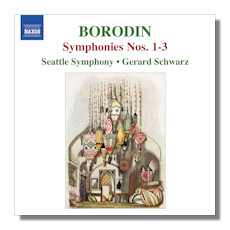
The Internet's Premier Classical Music Source
Related Links
- Borodin Reviews
- Latest Reviews
- More Reviews
-
By Composer
-
Collections
DVD & Blu-ray
Books
Concert Reviews
Articles/Interviews
Software
Audio
Search Amazon
Recommended Links
Site News
 CD Review
CD Review
Alexander Borodin

Symphonies
- Symphony #1
- Symphony #2
- Symphony #3 (orch. Glazunov)
Seattle Symphony Orchestra/Gerard Schwarz
Naxos 8.572786
These are outstanding performances, especially of the Symphonies #1 and #3, which have sorely lacked for good readings in such good sound. As far as complete sets go, there have really been two options for collectors; Loris Tjeknavorian on RCA, and Andrew Davis, now on Newton Classics. Both are excellent, both are in fine sound, and most importantly, both are fairly easy to find. This disc from 2011 is the third option, and arguably the best.
For one thing, all three symphonies are on one budget-priced disc; the aforementioned sets use at least two. Secondly, these performances sound absolutely stunning and make the two lesser-known works legitimately interesting. Loris Tjeknavorian is possibly more exciting – especially in the Symphony #2 – but Schwarz has the better orchestra and more modern recording. 2011 was also the year in which Schwarz and his orchestra released two marvelous volumes of Rimsky-Korsakoff, and so Russian music was clearly a strength during the maestro's final seasons with that ensemble. The quality of ensemble far outclasses most "classic" Russian issues, while the engineering is similarly first-class.
In the Symphony #1, Schwarz manages to give the music real shape and highlights the Russian spirit of this work very effectively. I read a review here that said the work was largely optimistic and had little emotional range. In the wrong hands, that is assuredly true, but with a fine musician at the helm, things get more interesting. The opening is aptly weighty, allowing the marvelous lower voices of the Seattle Symphony to grab our attention. String playing is wonderful throughout, but then, so is everyone else's. I find the soaring melodies greatly enhanced by such crisp articulation. The sound is warm and enhances my enthusiasm; less dry than this team's Rimsky project, the full sonority of the orchestra is clearly audible. That's a good thing, too. The climaxes here are genuinely explosive, and there actually is a wide range of moods and tones within the work. All this praise for the technical side of things cannot entirely convince me that the work is unjustly neglected, though. Despite the conductor's best efforts and expressive touches, I find the piece somewhat rambling and superficially exciting. A great reading like this is still most welcome.
If the Symphony #1 is musically so-so, the Symphony #2 is amazing. In fact, many of my favorite books on music call it one of the finest Russian symphonies of all. Certainly, it outclasses the other entries from the "Mighty Five". Borodin had wonderful ideas, but – as is well-known by now – his work as one of his nation's foremost chemists and teachers seriously hampered his ability to complete his work. Here, everything comes together to create a musical masterpiece. This is a tremendous reading of fervor and passion, with Schwarz generating a ton of heat despite a steadfast refusal to rush. Once again, the low strings and brass in the Seattle ranks grab your attention off the bat. Schwarz was in his final year at the helm here, and had created his own personal ensemble. Everyone plays extremely well, with tons of personality and beauty to boot. Wonderfully recorded, this is a prime recommendation.
While the two movements of the Symphony #3 don't lack in color (nothing Borodin ever wrote lacks for that) I find the "work" a curio more than anything else. There seems to be an idea that if something in classical music is left unfinished, then it must have hidden treasures lurking within it. Borodin was no Schubert, Mozart, or Mahler. While this is lovely music, it simply isn't a neglected masterpiece. On the other hand, I've never heard a better case for it than the one we have here, and I probably won't go looking for another one. In short, Schwarz gives the outer Symphonies everything he has, and it's enough for me. With an unquestionably great Symphony #2 in the middle, this could be the only disc of this music you ever need.
Copyright © 2014, Brian Wigman




















